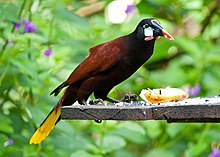Montezuma oropendola
| Montezuma oropendola | |
|---|---|
 |
|
| Male at Cordillera de Talamanca, Costa Rica
Montezuma Oropendola song and calls, recorded in Heredia Province, Costa Rica
|
|
| Scientific classification | |
| Kingdom: | Animalia |
| Phylum: | Chordata |
| Class: | Aves |
| Order: | Passeriformes |
| Family: | Icteridae |
| Genus: | Psarocolius |
| Species: | P. montezumai |
| Binomial name | |
|
Psarocolius montezuma (Lesson, 1830) |
|
 |
|
| Range of Psarocolius montezuma | |
| Synonyms | |
|
Gymnostinops montezuma |
|
Gymnostinops montezuma
The Montezuma oropendola (Psarocolius montezuma) is a New World tropical icterid bird. It is a resident breeder in the Caribbean coastal lowlands from southeastern Mexico to central Panama, but is absent from El Salvador and southern Guatemala. It also occurs on the Pacific slope of Nicaragua and Honduras and northwestern Costa Rica. It is among the oropendola species sometimes separated in the genus Gymnostinops. The English and scientific names of this species commemorate the Aztec emperor Moctezuma II.
The sexes are very different in size; the male is 50 cm (20 in) long and weighs 520 g (18 oz); the smaller female is 38 cm (15 in) long and weighs 230 g (8.1 oz).
Adult males are mainly chestnut with a blackish head and rump, and a tail which is bright yellow apart from two dark central feathers. There is a bare blue cheek patch and a pink wattle, the iris is brown, and the long bill is black at the base with a red tip. Females are similar, but smaller than males with a smaller wattle. Young birds are duller than adults and have a paler and less demarcated bill. No subspecies are currently recognized.
The "unforgettable"song of the male Montezuma oropendola is given during the bowing display, and consists of a conversational bubbling followed by loud gurgles, tic-tic-glik-glak-GLUUuuuuu. Both sexes have loud cack and crrrk calls.
Although the chestnut-headed oropendola shares much of this species's range, it is smaller, mainly black with a chestnut head (instead of mainly chestnut with a blackish head), and lacks coloured facial patches, so the two oropendolas are unlikely to be confused.
...
Wikipedia

